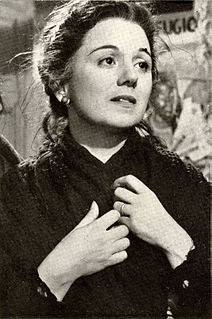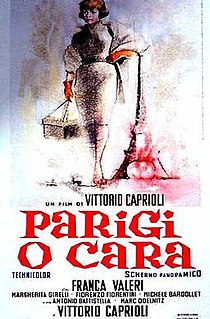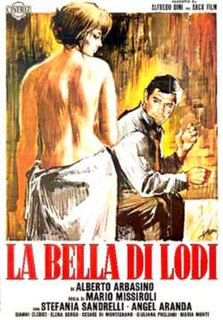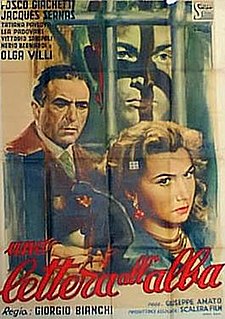
The Sky Is Red is a 1950 Italian drama film. It is the directorial debut of Claudio Gora and it is based on the novel with the same name by Giuseppe Berto, depicting the struggle for survival of a group of boys and girls in a bombed-out town in Italy during World War II.

Clelia Matania was an Italian film and voice actress.

Prepotenti più di prima is a 1959 Italian comedy film directed by Mario Mattoli and starring Aldo Fabrizi. It is the sequel of I prepotenti.

Carmelo Pompilio Realino Antonio Bene, known as Carmelo Bene, was an Italian actor, poet, film director and screenwriter. He was an important exponent of the Italian avant-garde theatre and cinema. He died of a heart ailment in 2002.

The Knight Has Arrived! is a 1950 Italian comedy film directed by Mario Monicelli and Steno and starring Tino Scotti, Silvana Pampanini and Nyta Dover.

Leoni al sole is a 1961 Italian comedy drama film. It is the directorial debut of Vittorio Caprioli.

I basilischi is a 1963 Italian drama film. It is the directorial debut of Lina Wertmüller.

City of Pain is a 1949 Italian drama film directed by Mario Bonnard.

The Earth Cries Out is a 1948 Italian action-drama film directed by Duilio Coletti.

Un uomo ritorna is a 1946 Italian drama film directed by Max Neufeld.

Parigi o cara is a 1962 Italian comedy drama film directed by Vittorio Caprioli.

Una vita violenta is a 1961 Italian drama film by Paolo Heusch and Brunello Rondi, at his directorial debut. It is based on a novel with the same name by Pier Paolo Pasolini.

La bella di Lodi is a 1963 Italian comedy film directed by Mario Missiroli. It is based on the novel with the same name written by Alberto Arbasino.

Department Store is a 1939 Italian comedy film directed by Mario Camerini.

La cuccagna, internationally released as A Girl... and a Million, is a 1962 Italian drama film directed by Luciano Salce.

Pelle viva is a 1962 Italian drama film written and directed by Giuseppe Fina.
Cecilia Dazzi is an Italian actress, television personality and songwriter.

Letter at Dawn is a 1948 Italian drama film directed by Giorgio Bianchi.

A che servono questi quattrini? is a 1942 Italian comedy film directed by Esodo Pratelli and starring Eduardo and Peppino De Filippo. It is an adaptation of a play with the same name by Armando Curcio that two years earlier the De Filippo brothers had played on stage with massive success and critical acclaim.
Fabio Garriba was an Italian stage, film and television actor.


















